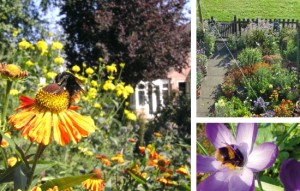 Get buzzed about summer gardening! We are not talking about juniper gin or elderberry wine here, but native bee friendly landscapes. Here in the Eagle Valley, we have a plethora of stunning fauna that can add beauty to your yard while helping to sustain vital bee populations. Here are the top ten reasons to plant a native bee friendly garden.
Get buzzed about summer gardening! We are not talking about juniper gin or elderberry wine here, but native bee friendly landscapes. Here in the Eagle Valley, we have a plethora of stunning fauna that can add beauty to your yard while helping to sustain vital bee populations. Here are the top ten reasons to plant a native bee friendly garden.
1. Bee Gardens are Beautiful
A bee friendly garden adds an array of color to your landscape. Bees are attracted to blue, purple, yellow and white flowers, all of which will add an extra pop of color to your garden.
2. Bee Gardens are Low Maintenance
Once native vegetation has been established, the garden requires little upkeep. These plants have adapted to surviving the harsh elements associated with high altitude. Native plants can withstand windy days and unexpected snow showers that are often part of summertime in the high mountains.
3. Bee Gardens are Sustainable
A native bee garden adds indigenous plants to the environment and naturalizes habitats for native insects and animals. Native plants also require minimal water, adding to their sustainability.
4. Bee Gardens Attract more than Bees
In a garden with a wide range of flora, you will attract a variety of pollinators, including hummingbirds and butterflies.
5. Bee Flowers Smell Sweet
Bees are attracted to plants that produce a sweet aroma. Planting bee friendly plants increases the pleasant smell your garden is sure to emit.
6. Bees Can Increase Vegetable Production
By strategically placing plants that attract bees in your vegetable garden, you can increase your yield of food production. Vegetable gardens benefit from the increased traffic of pollinators as they also help pollinate the veggies.
7. Bees Make Honey!
By providing bees with a place to gather nectar and pollen, they can turn the fruits of your garden into sweet, sweet honey. You can bathe in the satisfaction that, when you purchase local honey, you know that you contributed to making it possible.
8. Bees Provide Living Learning Laboratories
Bees are fun to observe! The saying busy bees is no coincidence; they work fast, moving from flower to flower, then back to the hive. It is truly mesmerizing to watch these insects at work in the garden.
9. Gardens Help Create a Sense of Place
Planting native plants creates a sense of pride in the mountainous vegetation that makes the Eagle Valley such a special place. The plants, insects and animals that visit your garden offer a special connection to our community.
10. Bee Gardens Help Bees
Bees currently face numerous obstacles that threaten their well-being, such as the use of pesticides and invasive species. Bees are vital to food production. Creating a bee friendly garden is one way to do your part to help bees and the planet.
You can purchase seeds specific to Colorado at a local nursery or online. Do not purchase generic wildflower seed mixes; as they often contain non-native plants. When caring for your garden, plant in a well-drained space and keep the soil moist until plants are established. Avoid the use of pesticides as they harm bees.
Bee Flowers for high alpine environments: Aspen Daisy, black eyed susan, blanket flower, golden banner, harebells, nodding onions, prairie smoke, rocky mountain penstemon, sage, showy milkweed, silver lupine, wallflower and white tufted primrose.
Enjoy the buzz!
Contributed by: Amanda Hewitt, Bee Enthusiast & STEM Coordinator at Walking Mountains Science Center in Avon









